The Plurinational State of Bolivia released the statement below on December 5 about the United Nations climate talks in Doha, Qatar. It was translated by Richard Fidler. Below that is Bolivia's official statement to the Doha talks. Both are reprinted from Bolivia Rising.
* * *
-
-
 Bolivia is one of the few countries that has consistently opposed treating biodiversity as a commodity at the United Nations Conference of Parties to the Convention on Biodiversity held in Hyderabad, India, over October 1-19. It has raised its voice against pro-market approaches in implementing the Strategic Plan and Aichi Targets of the UN's Convention on Biodiversity (CBD).
Bolivia is one of the few countries that has consistently opposed treating biodiversity as a commodity at the United Nations Conference of Parties to the Convention on Biodiversity held in Hyderabad, India, over October 1-19. It has raised its voice against pro-market approaches in implementing the Strategic Plan and Aichi Targets of the UN's Convention on Biodiversity (CBD). -
“Washington has refused to extradite a former Bolivian president to the South American country to stand trial over political violence that forced him from office nine years ago”, Reutuers reports that Bolivian President Evo Morales said on September 7. Bolivia wants former US-backed president Gonzalo Sanchez de Lozada, known as “Goni”, to face charges over corruption allegations and for his role in the deaths of 63 people killed by security forces during the 2003 uprising that overthrew him.
-
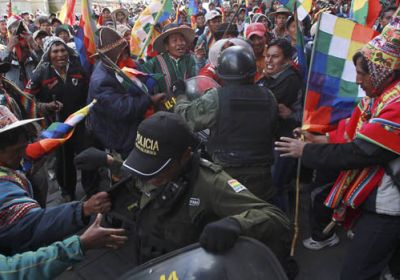 For the Financial Post, the recent actions of the Bolivian government in nationalising a Canadian mine confirmed the country’s status as an “outlaw nation”, according to an August 3 article. But for less biased observers, the reality was a little different. Responding to pressure from local indigenous communities the Bolivian government confirmed on August 2 that it would expropriate the operations of a Canadian-owned mining project.
For the Financial Post, the recent actions of the Bolivian government in nationalising a Canadian mine confirmed the country’s status as an “outlaw nation”, according to an August 3 article. But for less biased observers, the reality was a little different. Responding to pressure from local indigenous communities the Bolivian government confirmed on August 2 that it would expropriate the operations of a Canadian-owned mining project. -
Bolivian President Evo Morales applauded on July 10 the agreement struck with indigenous peoples from the mining town of Mallku Khota, in the north of Potosi, to nationalise a Canadian-owned mining company. Morales said the agreement ensures the state can continue recuperating natural resources to benefit the Bolivian people. The head of state met with leaders from the ayllus (indigenous communities) in this region that were demanding the concession granting to the Canadian company South American Silver (SAS) be annulled.
-
Bolivian President Evo Morales once again used the opportunity of May 1, the international workers’ day, to announce his left-wing government's latest nationalisation. This time, it was the turn of Transportadora de Electridad (TDE), a subsidiary of the Spanish-owned Red Electrica de Espana (REE), which controlled Bolivia’s national electricity transmission grid. The nationalisation was another step towards meeting the long-standing demand of the Bolivian people to return privatised companies to state hands.
-
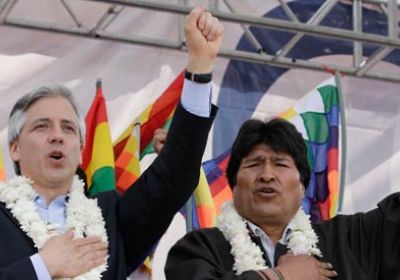 Bolivia’s vice-president Alvaro Garcia Linera brought a message of hope and anti-imperialist commitment to Mexico in early February. Speaking to an overflowing assembly of students and university personnel at Mexico City’s UNAM (National Autonomous University), he said the left-wing government led by President Evo Morales welcomes social-movement protests and conflict. The more, the better. “The struggle is our nourishment, our peace,” Garcia Linera said. “It does not overwhelm us. Absolute calm frightens us.
Bolivia’s vice-president Alvaro Garcia Linera brought a message of hope and anti-imperialist commitment to Mexico in early February. Speaking to an overflowing assembly of students and university personnel at Mexico City’s UNAM (National Autonomous University), he said the left-wing government led by President Evo Morales welcomes social-movement protests and conflict. The more, the better. “The struggle is our nourishment, our peace,” Garcia Linera said. “It does not overwhelm us. Absolute calm frightens us. -
Member countries of Latin America’s alternative integration bloc, the Bolivarian Alliance for the Peoples of Our America (ALBA), met for its 11th summit in Caracas on February 4 and 5 to discuss advancing the organisation. ALBA is made up of the governments of Venezuela, Cuba, Bolivia, Ecuador, Nicaragua, Dominica, Saint Vincent and the Grenadines, and Antigua and Barbuda. Formed in 2004, ALBA seeks to develop trade on the basis of solidarity and cooperation.
-
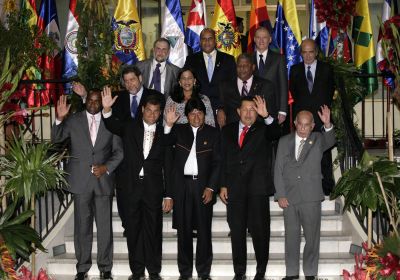 Seven years after being launched by the Venezuelan and Cuban governments, the Bolivarian Alliance for the Peoples of Our Americas (ALBA) has become an important voice on the global stage willing to stand up and denounce capitalism. ALBA has grown to include eight Latin American and Caribbean countries (Venezuela, Cuba, Bolivia, Ecuador, Nicaragua, Antigua and Barbuda, Dominica, Saint Vincent and the Grenadines.
Seven years after being launched by the Venezuelan and Cuban governments, the Bolivarian Alliance for the Peoples of Our Americas (ALBA) has become an important voice on the global stage willing to stand up and denounce capitalism. ALBA has grown to include eight Latin American and Caribbean countries (Venezuela, Cuba, Bolivia, Ecuador, Nicaragua, Antigua and Barbuda, Dominica, Saint Vincent and the Grenadines. -
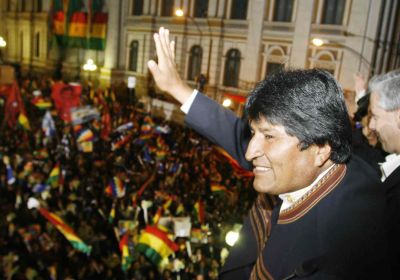
The recent march in Bolivia by some indigenous organisations against the government’s proposed highway through the Isiboro Secure National Park and Indigenous Territory (TIPNIS) has raised much debate among international solidarity activists.
-
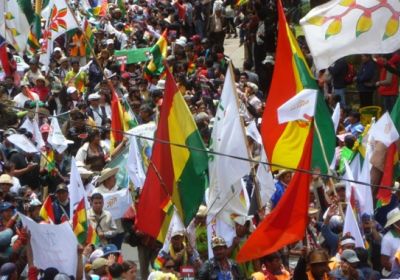
Despite the government reaching an agreement with indigenous protesters on all 16 demands raised on their 10-week march onto the capital, La Paz, the underlying differences are far from resolved.
-
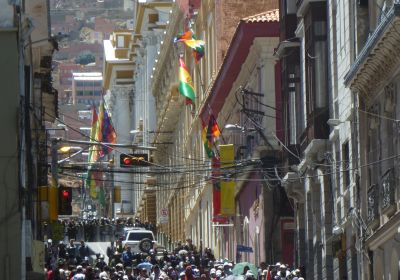 September 25 will go down as one of the darkest days in Bolivia since Evo Morales was elected as the country’s first indigenous president almost six years ago. After more than 40 days of indigenous protesters marching, police officers moved in to repress those opposed to the government’s proposed highway that would run through the Isiboro-Secure National Park and Indigenous Territory (TIPNIS). The controversial highway has met with both opposition and support from the many indigenous and social organisations that form the Morales government’s support base.
September 25 will go down as one of the darkest days in Bolivia since Evo Morales was elected as the country’s first indigenous president almost six years ago. After more than 40 days of indigenous protesters marching, police officers moved in to repress those opposed to the government’s proposed highway that would run through the Isiboro-Secure National Park and Indigenous Territory (TIPNIS). The controversial highway has met with both opposition and support from the many indigenous and social organisations that form the Morales government’s support base.